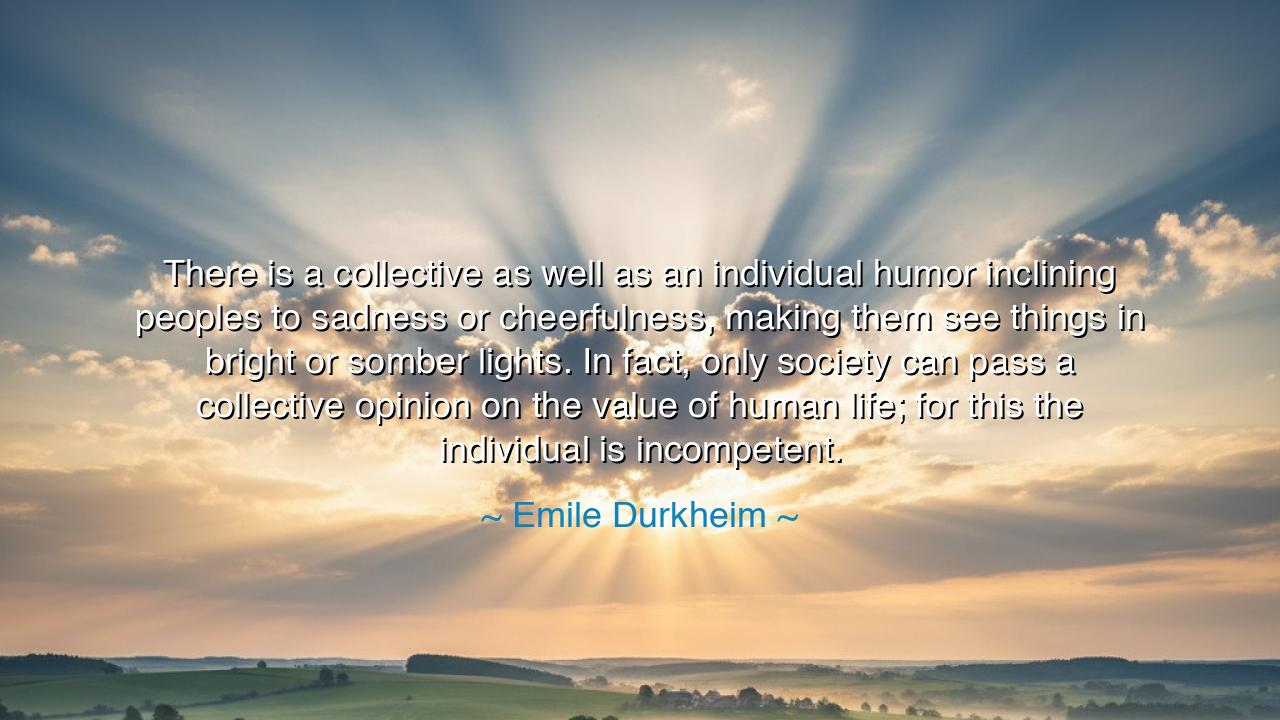
There is a collective as well as an individual humor inclining
There is a collective as well as an individual humor inclining peoples to sadness or cheerfulness, making them see things in bright or somber lights. In fact, only society can pass a collective opinion on the value of human life; for this the individual is incompetent.






In the great tapestry of human existence, where each soul treads a unique path, there is a deeper force that unites us all: society. Émile Durkheim, the great sociologist, once observed, "There is a collective as well as an individual humor inclining peoples to sadness or cheerfulness, making them see things in bright or somber lights. In fact, only society can pass a collective opinion on the value of human life; for this, the individual is incompetent." These words echo a truth that transcends the self, reminding us that our emotional landscapes—our joys, our sorrows, our laughter, and our tears—are shaped not only by our personal experiences but by the larger currents of collective thought. It is through society that we come to understand our place in the world and assign meaning to our existence.
The ancients understood well that no individual exists in isolation. The philosopher Aristotle, in his exploration of the political animal, argued that humans are inherently social beings, shaped by the communities in which they live. Durkheim’s insight into the nature of humor and emotion extends this idea, suggesting that what makes us laugh or mourn is not only a matter of personal disposition but also the values, beliefs, and collective experiences of the society to which we belong. Just as Aristotle saw humans as dependent upon the polis, the city-state, for their fullest expression of virtue, so too did Durkheim see society as the great adjudicator of emotional meaning. The individual, in isolation, cannot fully grasp the larger context of life, for it is society that gives shape to our understanding of both joy and sorrow.
The power of collective humor can be seen throughout history, where the laughter of the many becomes a reflection of the values and struggles of the time. Consider the Roman Empire, a society that found humor in the most absurd of circumstances. From the satirical writings of Juvenal to the bawdy performances in the Colosseum, Romans used humor as both an escape and a mirror to their social realities. Yet, their humor was not just individual; it reflected the shared experiences of their empire—the glory of conquest, the grief of war, and the inequalities that permeated Roman life. In this, we see the truth of Durkheim’s words: the laughter of a people is never simply a personal reaction but a collective judgment on the world they inhabit. It is society that guides and shapes the emotional expression of its members, defining what is worthy of laughter and what deserves tears.
The lesson we learn from Durkheim’s reflection is profound. It teaches us that our emotional reactions—the joy we feel or the sorrow we bear—are not solely our own, but are deeply intertwined with the society we live in. The humor of a society reflects its deepest values and fears, its aspirations and failures. Just as the ancient Greeks used theater to explore the human condition, so too does modern society express its collective soul through art, media, and public discourse. Our laughter and sadness are not mere personal experiences but signals of the shared moral and emotional landscapes of our time. This understanding invites us to look at our emotions not as isolated events but as part of a larger, ever-evolving dialogue within society.
Yet, Durkheim also reminds us that the individual cannot truly pass judgment on the value of human life without the lens of society. The self, while a powerful force, is limited in its capacity to assess the broader context of existence. The individual’s understanding of life’s meaning and purpose is always constrained by their own experience and worldview, which are shaped by the social environments in which they were raised. This is why the great philosophers, from Socrates to Confucius, believed that the pursuit of truth and virtue required engagement with the community, the polis, or the larger collective. It is through the collective voice of society, shaped by tradition, culture, and shared knowledge, that we gain a fuller understanding of life and its value.
In our own lives, this wisdom urges us to recognize that the emotional truths we hold dear are not absolute, but are shaped by the world around us. Just as humor in ancient Rome was a reflection of the empire’s values, so too is our own sense of humor and emotion a reflection of the society in which we live. To truly understand the nature of our laughter and sorrow, we must step back and examine the values and beliefs that have shaped our collective consciousness. Are we living in a time that celebrates joy, or are we entrenched in sorrow? What do our collective emotions tell us about the state of the world we inhabit? These are questions not of the individual soul, but of the society that shapes it.
The path forward, then, is not one of isolation or individualistic rebellion, but one of understanding our place within the larger tapestry of society. Let us engage with the world around us, recognizing that our emotional responses—our laughter, our tears, our joys, and our fears—are not just personal experiences, but the shared reactions of a people living in a particular moment. In this, we find a deeper sense of connection to one another, for humor and sorrow are the common language of humanity. Let us use this understanding to guide our own actions, to question the values of the society we are part of, and to shape a world that reflects our highest ideals, a world in which the laughter of the many mirrors the wisdom of the ages.






AAdministratorAdministrator
Welcome, honored guests. Please leave a comment, we will respond soon